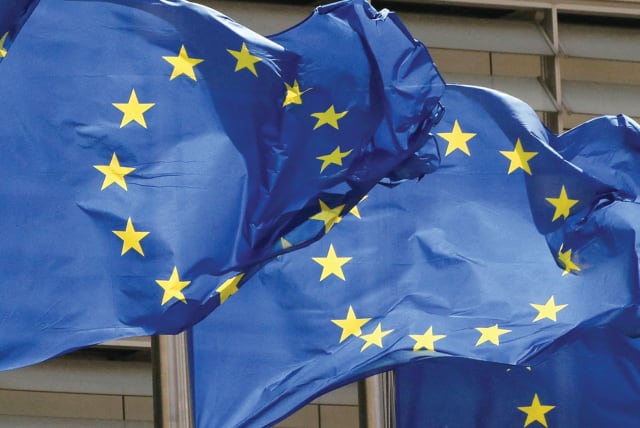23 EU countries have adopted national strategies to combat antisemitism - report

Many EU Member States now have national strategies to fight antisemitism and protect Jewish heritage and culture.
Twenty-three EU member states have developed national strategies to combat antisemitism since 2021, the EU Commission found in its first progress report of the 2021-2030 EU Strategy on combating antisemitism and fostering Jewish life, which was published on Monday.
The 2021 strategy was centered on three pillars: one, to prevent all forms of antisemitism; two, to protect and foster Jewish life; and three, to promote research, education and Holocaust remembrance.
The commission stated that the progress report's publication comes at a time of "a dramatically worsened situation for Jews in the EU" since October 7.
The statement added that the current levels of European antisemitism are unprecedented in the history of the EU.
The findings
The first progress report found that, in the three years since the EU released its plan to combat antisemitism, 23 member states have developed national strategies against antisemitism, and 20 member states have appointed a special envoy or national coordinator on combating antisemitism.
The report also found that 25 member states have adopted the International Holocaust Remembrance Alliance definition of antisemitism, and as a result now take a more victim-based approach to combating Jew-hatred.
There are 27 member states in total.
The countries that did not adopt national strategies were Belgium, Malta, Poland and Lithuania.
Case studies for countries combating antisemitism
The report outlined the measures taken by member states to achieve the pillars of the strategy.
For example, the report found that the Swedish Government’s task force for Jewish life, established in January 2023, "engages in dialogue on preventive measures and initiatives to make it easier to live a Jewish life and to prevent and combat antisemitism in Sweden."
Sweden's task force comprises state secretaries from six ministries and is led by the Prime Minister’s State Secretary.
In Germany, most federal states have appointed antisemitism commissioners to the offices of their public prosecutors general.
The report also found that German has sought to standardize the application of the law in processing antisemitic offenses, to ensure that public prosecutor’s offices communicate with each other and coordinate their investigations, and to administer advanced training on the topic.
Austria, following the October 7 massacre, adopted the ‘Package of measures against antisemitism and antisemitic disinformation in the digital space' on 18 March 2024.
Austria brought in 16 new measures to increase cooperation between the Federal Government and the large internet platforms and search engines to ensure proper implementation of the Digital Services Act.
Caste studies for fostering Jewish life
In terms of fostering Jewish life, the Government of the Czech Republic approved an annual contribution of 260 thousand EUR per year to support the protection of Jewish communities.
The funding goes directly to the Federation of the Jewish Communities of the Czech Republic.
In Spain, the report found that the Centro Sefarad-Israel, which is founded and supported by the Spanish Ministry of Foreign Affairs, European Union and Cooperation, organises a summit which aims to keep the legacy of the Jewish roots of Spain alive.
It does this by bringing together Sephardic Jewish communities and institutions with the aim of "deepening knowledge of the Sephardic legacy."
Finland, despite having a prohibition on the slaughter of animals unless it is the quickest and least painful method, has safeguarded kosher slaughter.
Addressing antisemitism in sports, Italy has signed a declaration which explicitly bans players from wearing the No 88 shirt and promised to suspend competitions where antisemitic acts occur.
The number 88 has been used by extremist groups and neo-Nazis to represent the Heil Hitler salute, as H is the 8th letter of the alphabet.
Other countries, such as Bulgaria, have worked to renovate synagogues and open museums. Estonia has restored its destroyed Old Jewish Cemetery.
Romania became the first European country to introduce the subject “History of the Jews. The Holocaust” for 11th and 12 graders.
"The determination to fight antisemitism in the EU is more relevant than ever," the report concluded.
"The European Commission is determined to use all available legal and policy tools to ensure that Jewish life can prosper across the EU and Jews can go about their lives free from security concerns and fully benefit from their democratic rights."
Jerusalem Post Store
`; document.getElementById("linkPremium").innerHTML = cont; var divWithLink = document.getElementById("premium-link"); if (divWithLink !== null && divWithLink !== 'undefined') { divWithLink.style.border = "solid 1px #cb0f3e"; divWithLink.style.textAlign = "center"; divWithLink.style.marginBottom = "15px"; divWithLink.style.marginTop = "15px"; divWithLink.style.width = "100%"; divWithLink.style.backgroundColor = "#122952"; divWithLink.style.color = "#ffffff"; divWithLink.style.lineHeight = "1.5"; } } (function (v, i) { });



